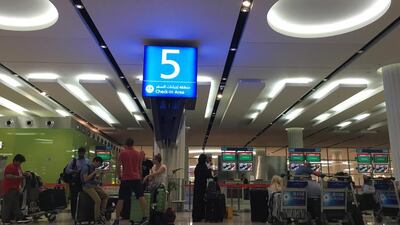Passenger numbers at Dubai International grew 7.4 per cent during the first quarter of the year, even as North American traffic was affected by the attempted US travel bans and curbs on electronic devices.
Total passenger numbers passing through Dubai International rose to 22.5 million during the three months to the end of March, compared with 20.9 million during the same period last year, according to operator Dubai Airports.
But growth on North American routes was hit by the introduction of restrictions on laptop and tablet usage onboard flights from Dubai by US authorities in late March, alongside a series of attempted travel bans to the US on citizens from mainly Muslim countries.
North American traffic fell 4.3 per cent year-on-year in March, with year-to-date traffic for the quarter rising by just 2.5 per cent.
“Many passengers are reluctant to want to put their prized devices into checked baggage – not just due to personal security but also because of the high risk of them being damaged in transit,” said Saj Ahmad, an analyst at StrategicAero Research in London.
“We often see baggage handlers throwing cases around – people are just not comfortable with that and so have elected to fly to the US via other transit points where restrictions do not exist.”
The airport’s total passenger traffic for March grew by 3.8 per cent year-on-year to 7.5 million, due to the timing this year of the Easter holidays in April compared with March last year.
“While there are fluctuations in growth market-by-market the overall trend is quite positive as evidenced by the 7.4 per cent increase in passenger numbers during the first quarter,” said Paul Griffiths, chief executive of Dubai Airports.
“That result keeps us well on track to meet our 2017 forecast of 89 million passengers.”
Eastern Europe was subject to the largest growth in passenger traffic during the quarter, expanding by 33.3 per cent year-on-year, with the appreciation of the rouble against the US dollar stimulating Russian tourist numbers.
Russian visitors to Dubai grew by 106 per cent in the first quarter, boosted by recent moves to allow citizens to obtain visas on arrival, according to data released this week by Dubai Tourism.
Passenger traffic at Dubai International from Asia rose by 22.6 per cent in the quarter, on the back of additional capacity from Emirates and flydubai to markets including China, Thailand and the Philippines.
India remains the most popular destination, accounting for 3 million passengers in the first quarter, followed by the UK and Saudi Arabia with 1.6 million passengers each.
London topped the list of destination cities with 974,950 passengers followed by Doha (797,729 passengers), Bangkok (633,496) and Mumbai (618,638).
Freight volumes passing through Dubai International rose 3.5 per cent to 636,479 tonnes in the quarter, boosted by an 8.4 per cent rise in cargo volumes in March alone.
jeverington@thenational.ae
Follow The National's Business section on Twitter

